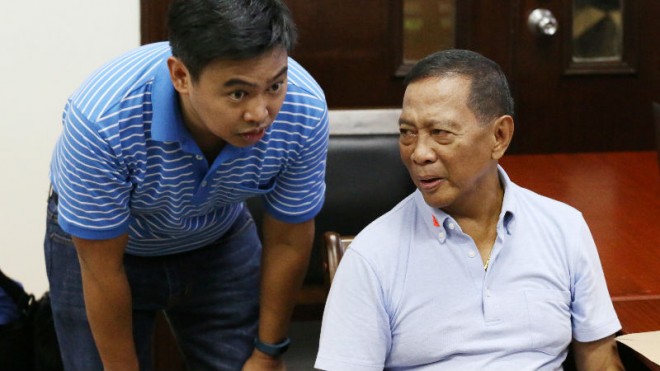Binays face trial for rigged contracts

VICE PRESIDENT Jejomar Binay (right) and his son Junjun Binay MARIANNE BERMUDEZ/INQUIRER FILE PHOTO
Former Vice President Jejomar Binay and his son, dismissed Makati City Mayor Jejomar Erwin Binay Jr., are facing trial on graft and falsification charges, which are bailable, this time for allegedly rigging the procurement for building the P1.3-billion Makati Science High School.
The cases arose from complaints filed by the Office of the Ombudsman’s Field Investigation Office against the Binays.
The agency has yet to resolve the more serious and nonbailable plunder complaint filed by Renato Bondal and Nicolas Enciso IV in 2014.
For now, there is enough basis to pursue a criminal indictment only for the violation of procurement rules.
“The overprice issue is still being investigated,” said an Ombudsman source, who explained that this was the crux of the plunder complaint.
Article continues after this advertisementPlunder is harder to prove because it involves allegations of ill-gotten wealth obtained through overt criminal acts.
Article continues after this advertisement2 resolutions
In two separate resolutions dated Aug. 1, Ombudsman Conchita Carpio Morales approved the finding of probable cause to order the Binays’ indictment for four counts of violating Section 3(e) of the Anti-Graft and Corrupt Practices Act and three counts of falsification of public documents.
Both offenses are bailable.
If convicted, the Binays face penalties of six to 10 years’ imprisonment for each count of graft, and six to eight years for each count of falsification.
The Ombudsman’s resolution on the criminal aspect of the case can still be appealed by way of a motion for reconsideration.
If the appeal fails, the case will be filed in the Sandiganbayan.
The Binays already have a pending case in the Sandiganbayan’s Third Division for graft and falsification in connection with the P2.2-billion Makati City Hall car park project.
The case has yet to move to the trial stage as the Binays and their coaccused are challenging the basis of the Ombudsman indictment.
‘Witch-hunt’
Sought for comment, Binay’s spokesperson, Joey Salgado, on Thursday criticized the Ombudsman’s moves as part of “her witch-hunt against former Vice President Binay and his family.”
“The allegations have been answered, but apparently disregarded by the Ombudsman. It once again underscores the selective prosecution of the Binays and the Ombudsman’s tendency to look the other way when other political personalities are involved,” Salgado said.
Makati City officials allegedly forged documents to make it appear there were other bidders who competed for the separate engineering and construction contracts awarded to Infiniti Architectural Works and Hilmarc’s Construction Corp.
The architectural and engineering contract was worth P17.37 million, while the six construction phases amounted to P1.33 billion.
First contract
The first contract was awarded by the elder Binay when he was mayor on Sept. 19, 2007, a day after the bids and awards committee supposedly held an hourlong negotiation conference and recommended the award to Infiniti.
Two of the seven architectural firms that purportedly joined the conference executed affidavits denying their participation.
Investigators also observed that all participating companies except Infiniti tendered bids that exceeded the approved budget for the contract.
The consultancy contract was allegedly tainted with various irregularities, such as the unjustified resort to negotiated procurement, noncompliance with the required posting of bid invitations and the lack of a timeline for the project’s completion.
Hilmarc’s bagged the construction contracts divided into six phases from 2008 to 2012, allegedly thanks to a conspiracy to falsify bidding documents, suppress information to prospective bidders and hastily award the contracts.
The Ombudsman noted that the chief operating officer of JBros Construction disowned the signatures on the bid documents he purportedly submitted.
Fake bid invitations
The publication of the bid invitations for Phases 1, 2, 4 and 5 were allegedly fake, as these did not appear in certified copies of the pertinent issues of Balita tabloid obtained from the National Library.
The alleged fabrication placed Hilmarc’s “on higher footing than any potential bidders,” as they were not sufficiently informed of the procurement.
Notably, the Ombudsman found that no other bidder participated in the public bidding for Phases 2, 4, 5 and 6.
Morales also found the process for Phases 1 and 2 of the construction contract to be flawed because the architectural design and engineering plans were not provided to the prospective bidders.
This would mean the bidders were not apprised of the construction details that would have been relevant in submitting their bid proposals.
Sham bidding
“This logically shows that the public bidding was nothing but a sham,” the Ombudsman said.
The Ombudsman also held the respondents in bad faith for releasing the payments “despite the obvious maneuverings … to suppress competition during the five ‘public biddings’ and one negotiated procurement that ensured the award of the contracts in favor of Hilmarc’s.”